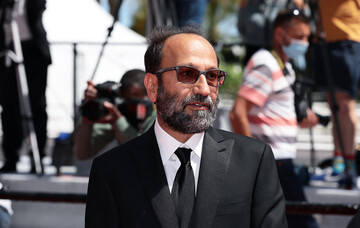Ghahreman (A Hero) was displayed at the Cannes Film Festival on Tuesday, which attracted foreign media and film critics. The movie shows the story of a man named Rahim, who is behind bars due to an unpaid debt, but during a two-day release from prison, he involves in adventures to convince the creditor to pardon.
The interesting story, which entails sophisticated and paradoxical adventures related to morality, was filmed in Shiraz, Fars province, Iran.
Renowned actors such as Amir Jadidi, Mohsen Tanabandeh, Fereshteh Sard-Orafaie and Sarina Farhadi starred in the drama.
Farhadi’s A Hero will compete with 23 movies made by filmmakers from France, the Netherlands, Finland, Japan, the United States, Chad, Thailand, Australia, Russia, Belgium, Hungary, Italy and Norway for the Palme d' Or.
Following Farhadi’s winning an award for the best screenplay in 2016 for “The Salesman,” his presence in this year’s Cannes Film Festival has prompted critics and media to publish different critiques.
Charlotte Pavard, an international journalist, wrote on the official website of the festival, “With Ghahreman (A Hero), Asghar Farhadi has allowed himself a remarkable return to Iran.”
Deadline, an American website, described Farhadi’s movie: “An excellent deed goes unhealthy in Asghar Farhadi’s Cannes Film Festival competitors title A Hero (Ghahreman), a thought-provoking watch which is maybe the filmmaker’s most delicate and heartfelt movie since A Separation.”
Hollywood Reporter wrote: “Oscar-winning filmmaker Asghar Farhadi returns to his native Iran with this story about truth-telling, honor and the price of freedom.”
Variety interviewed Farhadi on the sidelines of the Cannes Film Festival, where he said: “From time to time in the news in Iran you get stories about very average people who in their daily lives do something that is very altruistic. And that humane way of making them very noticeable in society for a few days, and then they are forgotten. The story of the rise and fall of these kinds of people was really what interested me.”
The Iranian filmmaker also told the American media company owned by Penske Media Corporation: “When I started working on the story I wasn’t so aware of social media. I developed that aspect when I realized that this is something so pervasive in every society around the world these days. It has become such a powerful tool of communication in every society and there are no borders. It’s the same in Iran and the rest of the world. But I think that what’s specific in Iran is that because there are tensions in society between different groups, opinions, ideologies, it becomes a tool in the hands of [groups of] people to confront the others. That’s the reason why it plays such as a major part in the development of this story.”
On media manipulation, Farhadi told Variety: “Well, it’s not even at the level of being a concern anymore. It’s a fact. It’s just the way we are living. I think it’s not even relevant to question this. It’s just the way we are. And the way we express things to each other. What I found interesting in the issues of this film is to see that all institutions and social groups use this tool. It’s a way of opening up to the other. But what I found paradoxical and interesting in this story is that instead of being a way of communicating and opening up to the other, it’s the exact opposite: a way of hiding and dissimulating things.”
Javier Ángel Encinas Bardem, the Spanish actor, depicted Farhadi as a king in cinema, who can win the Palme d' Or once more.


Your Comment